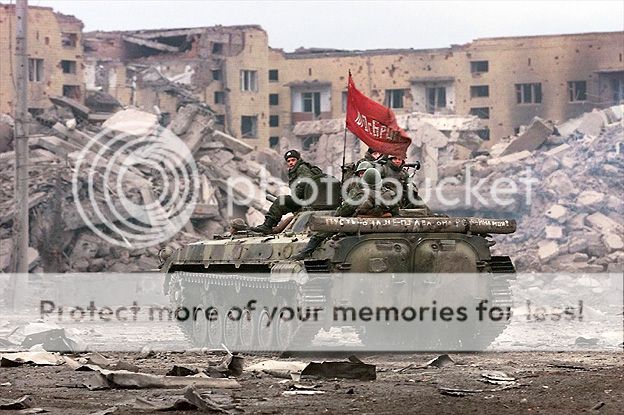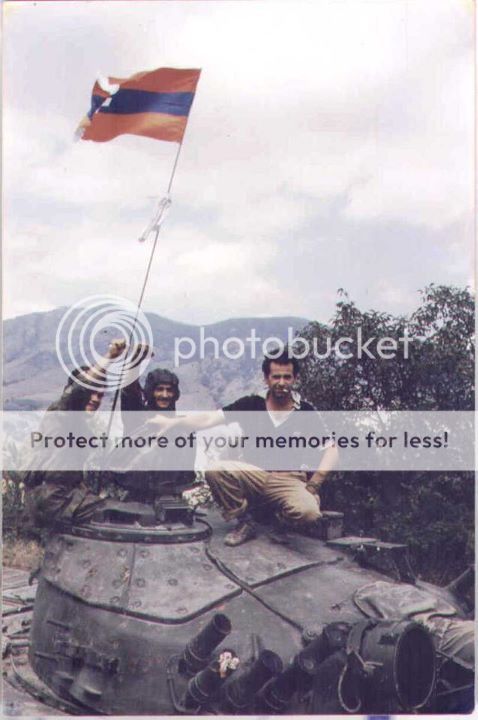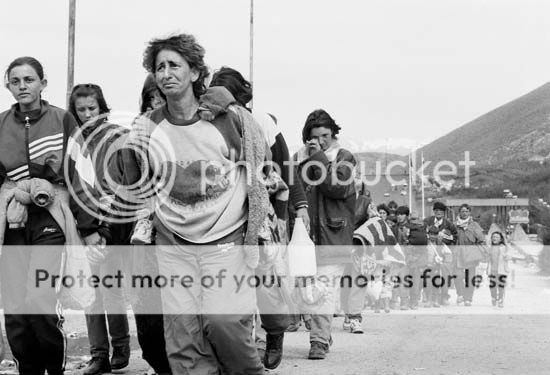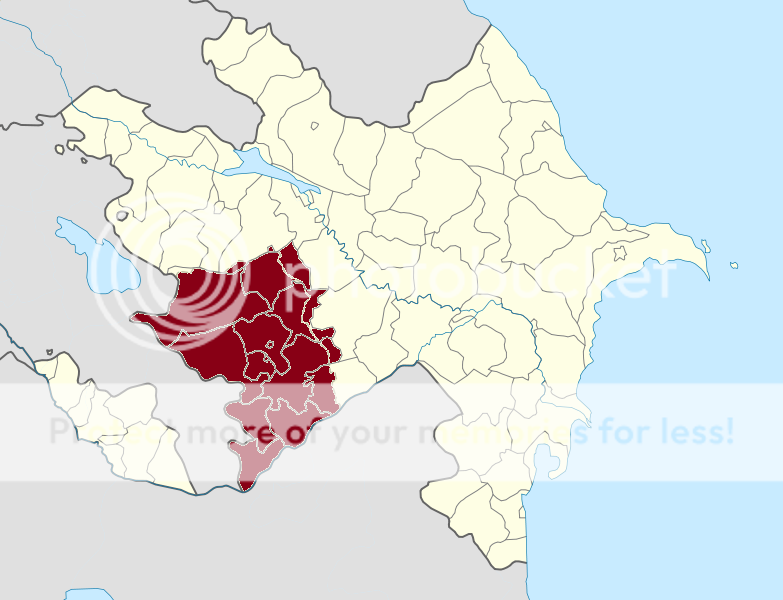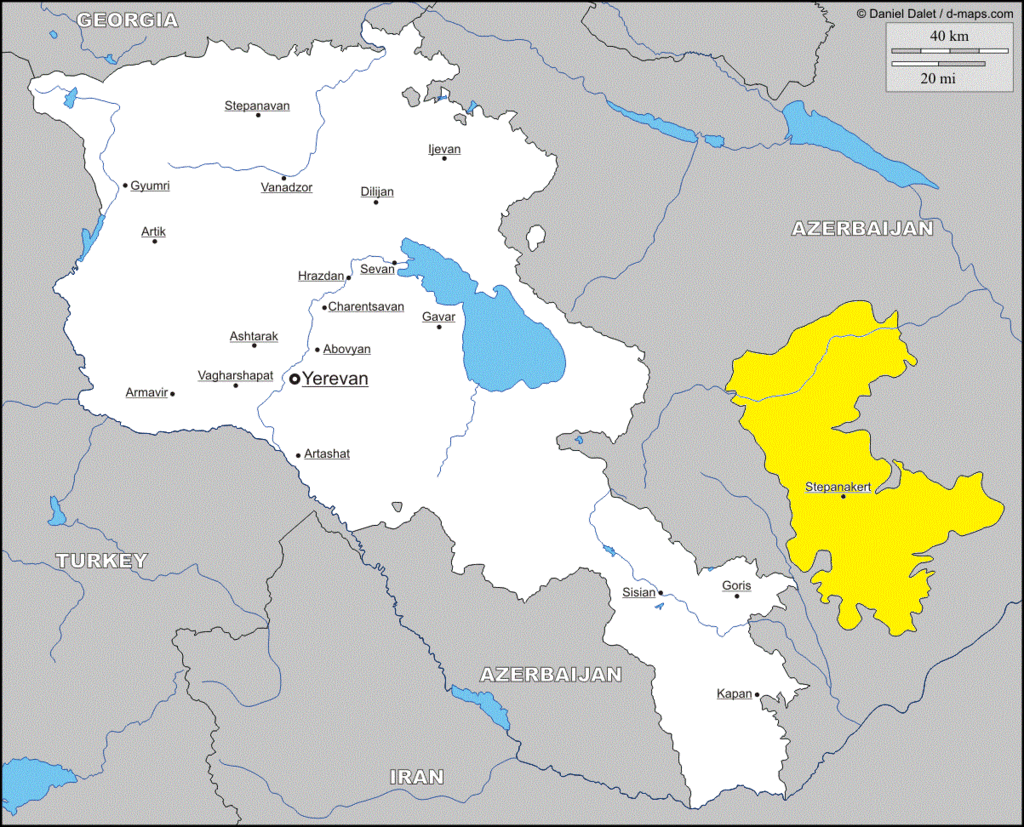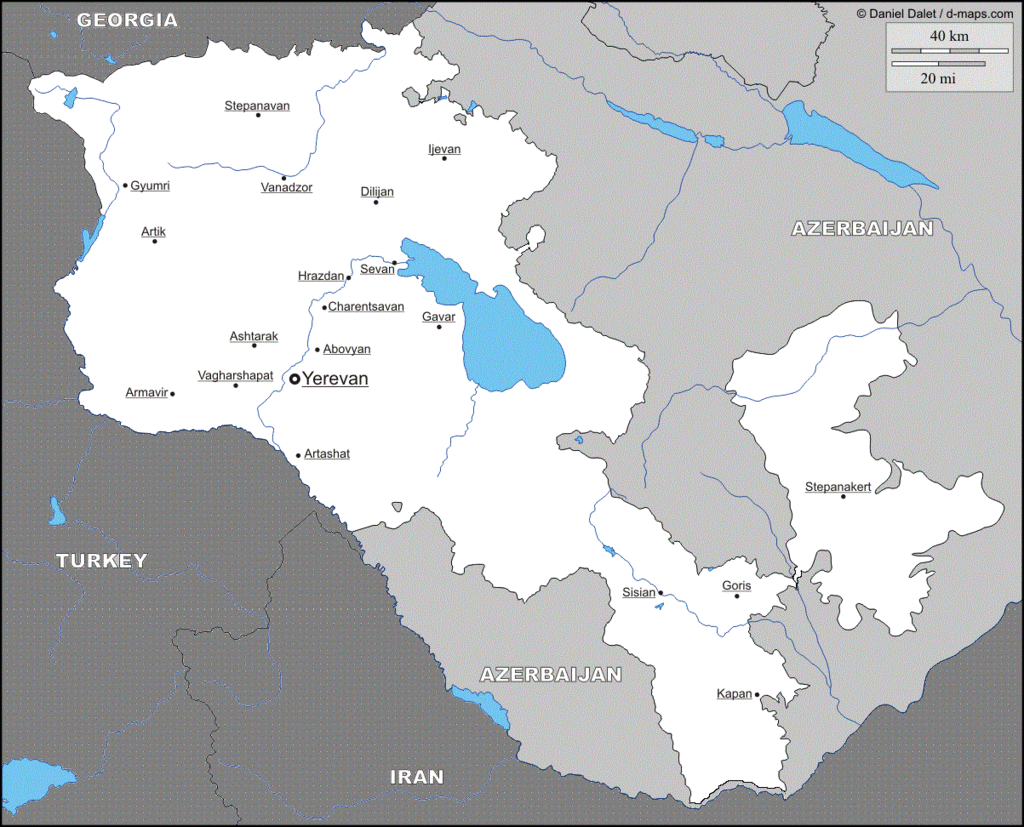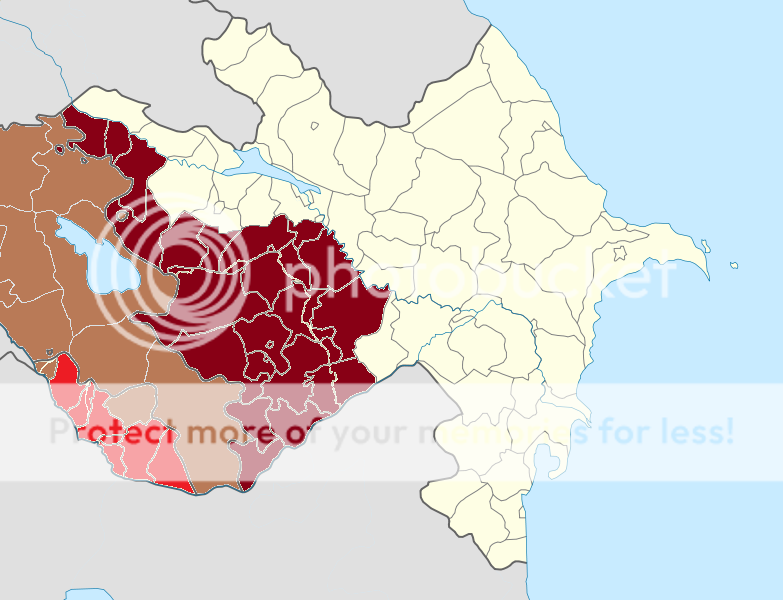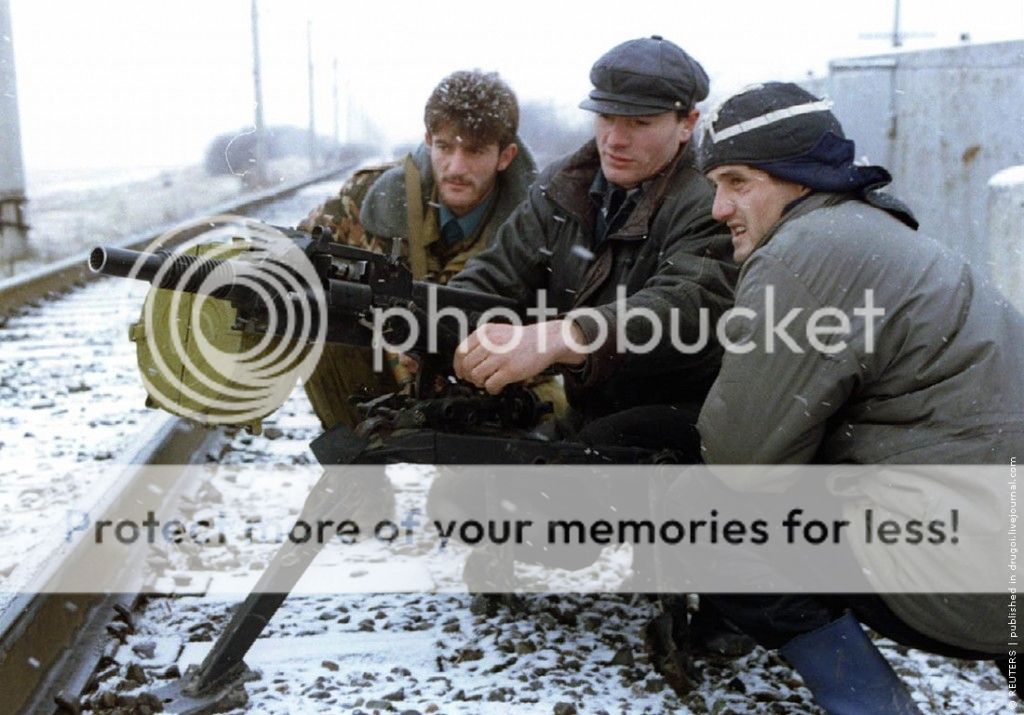PART FOURTEEN: THE ROAD TO ALAT
PART FOURTEEN: THE ROAD TO ALAT
PART FOURTEEN: THE ROAD TO ALAT
The Road to Alat: The War in Azerbaijan
Graphic Novel
By Joe Stefano
(2000)
Fantagraphics Books
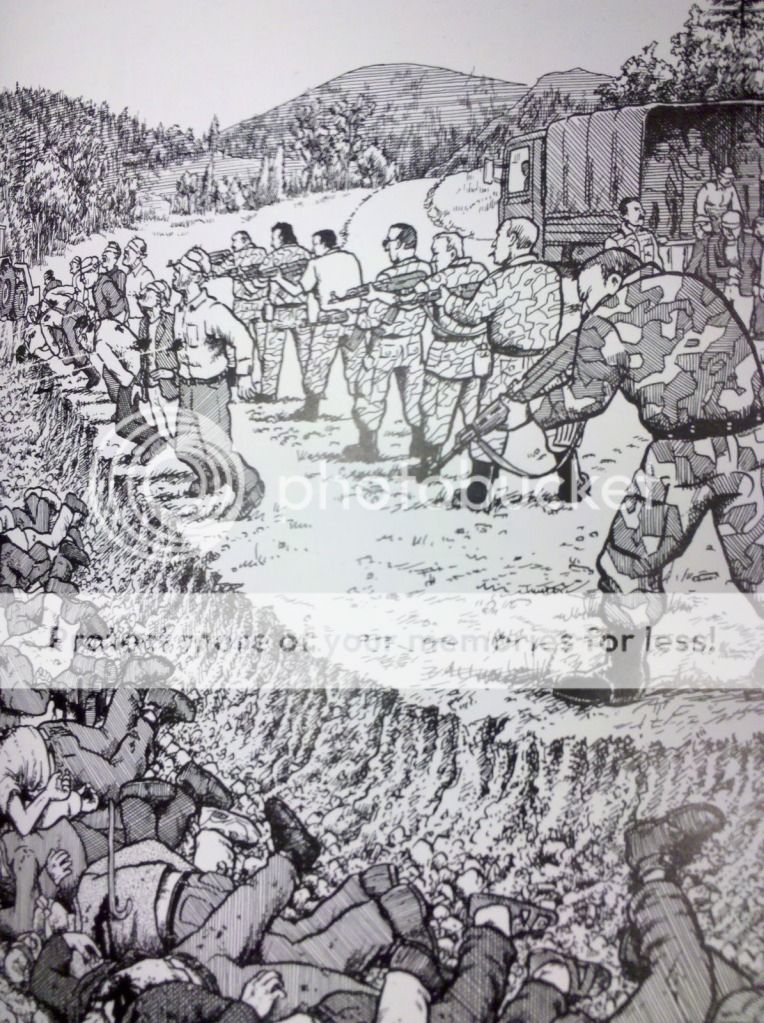
My name is Vanes Hovhannissyan.
I am Armenian.
My family is from Baku.
We fled during Black January, the previous year.
And now, here I am, back in the city of my birth.
Liberating my country.
Avenging my people.
And I am ashamed.
The Russians are bombing the city.
The Armenians brought over the heavy artillery. We are raining fire down on them.
And nobody can get out.
Unless they pass through us first.
We control the road to Alat, and the Russians are letting us do whatever we want.
I am pulling men out of the line of refugees.
We are shooting them.
I am sure this is what the Turks did to our people over seventy-five years ago.
I am sure that this is what genocide looks like.
And someday when my grandchildren ask me about genocide I will hide from them, and tell them nothing of the Young Turks.
Because I don’t want them to know.
That I am the Young Turks.
That the word genocide was stolen from us.
And our people.
And our history.
Not by a politician in Ankara.
But by me, on that cold night in October.
On the road to Alat.
Report Finds Pilot at Fault in Fatal Crash of Aeroflot 335
Time Magazine
By William Smith Jr.
Published: March 22, 2002
WASHINGTON — Aeroflot flight 335 crashed at sea four years ago because of a ''manipulation of the airplane controls'' by the pilot, the National Transportation Safety Board concluded in a report released today. The finding ruled out mechanical problems, evasive action to avoid another airplane, terrorism or any other cause. The report did not address the question of why the pilot acted as he did, nor did it use the word suicide.
The crash, of an Ilyushin Il-96-300 en route to Moscow from Bogota on Oct. 31, 1997, killed the other 3 cockpit crew members, 6 flight attendants and 101 passengers, along with the pilot, Colonel Yuri Kusenko.
Another Aeroflot pilot told the Federal Bureau of Investigation months after the crash that Colonel Kusenko had been despondent and “appeared to be deeply troubled” in the days leading up to the crash.
“He always would become depressed in the month of October,” the pilot said, “but this month it was particularly upsetting.”
The report, which does not mention the pilot's contention, said ''the reasons for the first officer's actions are unknown.''
The Russian Civil Aviation Authority, in a statement distributed by the public relations agency it hired after the crash, said the American investigators (who had been asked to lead the investigation by the Colombian government) had ''failed to fully investigate a credible body of evidence supporting the theory that the crash was the result of a suicide mission perpetrated by an Islamic terrorist organization based in Pakistan.'' It said further investigation was necessary, and that the UIS government would appeal the decision.
When American investigators began discussing the possibility that suicide was the cause of the crash, UIS objected that there was no evidence that the Colonel was in any way suicidal. Colonel Kusenko, it was noted, was a decorated military pilot who was awarded the country’s first “Medal of Nesterov Award” commemorating his performance in the conflict in the breakaway republic of Azerbaijan in 1991. He also was widely regarded as a national hero, and the allegations of suicide are highly controversial in the UIS.
“Colonel Kusenko was a great patriot who was loved by his wife, his children and his countrymen,” a spokesperson for the UIS said in a press conference this morning, “why would a man who has so much in his life commit such a terrible act. It simply doesn’t make any sense.”
The safety board based its conclusions on the evidence recorded by the flight data recorder, which showed that the autopilot was turned off when the plane went into a wings-level dive. Also, there was evidence in the form of statement made by Kusenko in Ukrainian and recorded by the cockpit voice recorder, which captured the officer repeating the phrase, “I’m sorry.” Moments before impact the cockpit voice recorder captured the Kusenko mumble “Baku.” UIS investigators said that the evidence proves that Kusenko was disabled by passenger Elman Farajov, an ethnic Azerbaijani who the UIS claims then crashed the plane into the Atlantic Ocean as an act of terrorism.
“Why would Colonel Kusenko commit suicide on the anniversary of one of his proudest achievements?” the spokesperson asked, “The capitulation of the Azerbaijani rebel movement was a proud day for all Russians and Ukrainians, and Colonel Kusenko was no exception. But clearly October 31st had a much different meaning to Farajov, a known terrorist sympathizer and Azeri nationalist.”
Critics note that Farajov, although fluent in Russian, was apparently not fluent in Ukrainian. Russian investigators countered that the similarities between the Russian and Ukrainian languages were close enough that a well trained terrorist could “learn a few key phrases in Ukrainian” in just a few days.
Major condemns bombing of Baku, calling it “disproportionate”
The Scotsman
October 29, 1991
The United Kingdom on Thursday criticized the UDR's military operations in Azerbaijan as "deeply troubling” and a “continuation of human rights violations" and urged a political solution to the conflict.
"The latest information on UDR operations in Azerbaijan indicates a continuation of deeply troubling human rights violations and the use of disproportionate force against civilian targets," spokesman Richard Campbell told reporters.
He said the lack of a political solution and the large number of credible reports of massive human rights violations are contributing to an environment that is favorable towards the emergence of terrorism.
The United Kingdom "would continue to urge both sides to seek a political solution to the conflict and urge accountability for human rights violations," he added.
Many Britons are calling on Conservative Prime Minister John Major to condemn the bombings of Baku and to refer to it as “genocide”. Labour Party leader Tony Blair has condemned the refusal of Major to call the bombing campaign genocide and has demanded that the British government sever ties with the new UDR government.
“Although the UDR has promised a commitment to real democratic reform, the unrelenting carpet bombing of the city of Baku, and the tens of thousands of casualties in the last 48-hours, show that this new Soviet Union is really no different than the one that preceded it. We cannot ignore our moral duty to condemn genocide just because those who perpetrate it profess a commitment to democracy.”
“Azerbaijan and Chechnya- “Profiles on the Russian "War on Terror”
(Routledge Series on Russian and East European Studies)
By John Miller
Routledge Press, (2007)
CHAPTER TEN
The declaration of independence from the new President Abulfaz Elchibey reportedly put Russian President Vladimir Zhirinovsky into an uproar, and by most accounts he overruled the wishes of UDR President Viktor Alksnis and ordered indiscriminate air strikes. With Baku completely encircled, few residents of the city had been able to flee before the bombing began, and those that remained struggled to escape the city over the 93-hour bombing campaign. As soon as bombings began what little resistance that remained in the western portion of the Republic collapsed as Armenian troops crossed the Kura River and soon joined their Russian allies on the outskirts of Baku. Bringing with them heavy artillery from Yerevan the Armenians followed the lead of the Russians and indiscriminately bombarded the city with 152-mm 2A36 Giatsint-B guns.
Initially many residents of Baku tried to flee on the train going north to Sumqayit, which although surrounded by UDR troops remained relatively unmolested. However, federal troops prohibited the train from passing through, leaving the road to Alat in the south as the only escape route. Once again, federal troops initially closed the road under orders of General Gennady Troshev. However, he was overruled by Russian Secretary of State Gennady Burbulis, who threatened to have Troshev arrested for war crimes the next time he set foot in Russia if he didn’t ease the humanitarian crisis that had developed in Baku. Troshev reluctantly relented, but almost immediately after opening the road to Alat, Armenian troops arrived and began a campaign of indiscriminate killing.
“Armenian troops began separating men between the ages of 14 and 60,” one witness recounted, “and then they would shoot them on the side of the road.”
Federal forces refused to intervene, and in the 93-hour campaign it was estimated that over 20,000 men were executed by Armenian troops before the road to Alat was again closed by General Troshev.
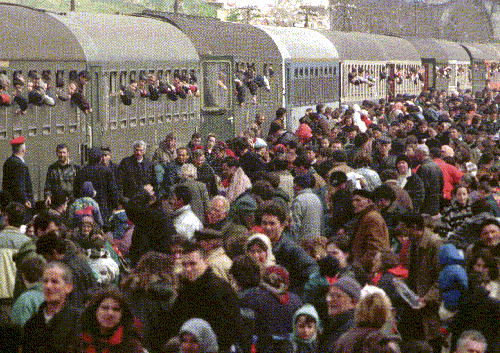
Residents in Baku attempt to escape the bombing (AP)
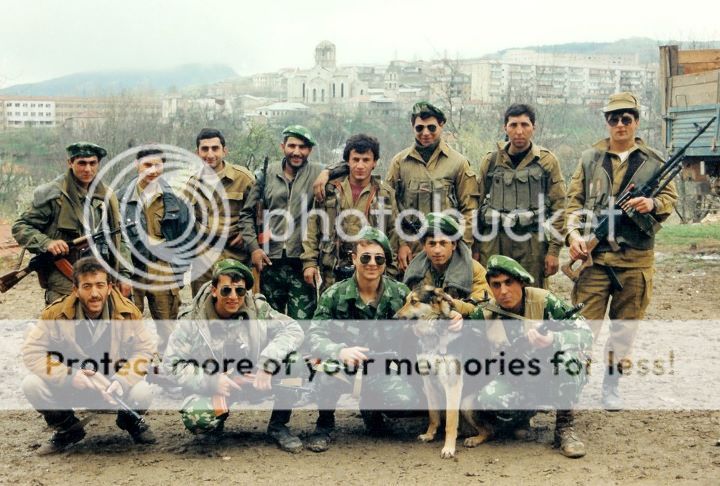
Armenian troops reach the outskirts of Baku (AP)
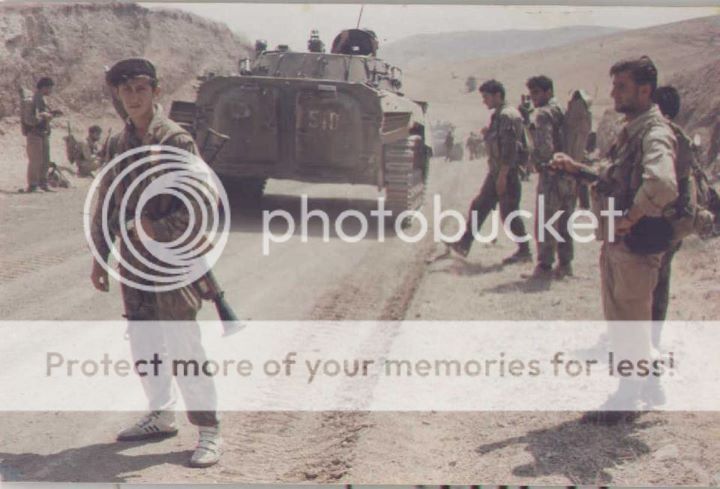
Armenian troops block the Road to Alat.
“My Russia- An Autobiography by former Russian Prime Minister Gennady Burbulis”
Published by Interbook, © 1998
CHAPTER TWENTY
Zhirinovsky was furious when I told him that I reopened the road to Alat to allow refugees to escape the bombing. He seemed determined to use the entire conflict as a testing ground for future conflicts in Central Asia, and he actually seemed pleased with the destruction he was causing. But it was nothing short of murder. The only defense the Azerbaijanis had to the air strikes were located at the Nasosnaya Air Base, which we controlled. And although control of the Tbilisi Air Defense Army was somewhat contested between the Federal government and the Georgian Republic, the Georgians were not going to come to the aid of Azerbaijan. Not with 20,000 Russian and federal troops fortifying in Sokhumi and Tskhinvali. The Tbilisi Air Defense Army was the air defense system of the Transcaucasus and North Caucasus regions in the Soviet Union, and it initially was major force designed to protect Baku from NATO air strikes. Now it was sitting still in fear as the Tupolevs leveled Baku. Zhirinovsky was especially pleased with the Tu-160’s, which were proving to be a most effective weapon against a powerless and exposed civilian population.
“Soon we will crush the Azerbaijani’s,” Zhirinovsky told us with a chuckle, “and I guarantee once the Uzbeks and Chechens, and Turkmens see what happens to the Azerbaijanis, they will think twice about opposing us.”
I slumped in my chair, not sure what to make of the statement. I feared that the bombing of Baku would have the opposite effect. Already in Tajikistan and Uzbekistan, federal troops were coming under attack from local militias, and in the west politicians in the United Kingdom and France were calling for sanctions! Much of Europe was recognizing the independence of the Baltic Republics, and Poland and Hungary were requesting an emergency meeting with German and British politicians to discuss admission into NATO! I felt defeated when I saw Vice President Zavidiya run into the room clearly ecstatic.
“Mr. President,” Zavidiya said, “your Azerbaijani counterpart, president Abulfaz Elchibey is on the phone. He wants to discuss a truce.”
“Hang up,” Zhirinovsky spat out, “the only terms I’m interested in is unconditional surrender, but only after he personally rejects Azerbaijani independence on national television.”
“Mr. President,” Zavidiya said with a smile, “he’s already agreed to both.”
PART FOURTEEN: THE ROAD TO ALAT
The Road to Alat: The War in Azerbaijan
Graphic Novel
By Joe Stefano
(2000)
Fantagraphics Books

My name is Vanes Hovhannissyan.
I am Armenian.
My family is from Baku.
We fled during Black January, the previous year.
And now, here I am, back in the city of my birth.
Liberating my country.
Avenging my people.
And I am ashamed.
The Russians are bombing the city.
The Armenians brought over the heavy artillery. We are raining fire down on them.
And nobody can get out.
Unless they pass through us first.
We control the road to Alat, and the Russians are letting us do whatever we want.
I am pulling men out of the line of refugees.
We are shooting them.
I am sure this is what the Turks did to our people over seventy-five years ago.
I am sure that this is what genocide looks like.
And someday when my grandchildren ask me about genocide I will hide from them, and tell them nothing of the Young Turks.
Because I don’t want them to know.
That I am the Young Turks.
That the word genocide was stolen from us.
And our people.
And our history.
Not by a politician in Ankara.
But by me, on that cold night in October.
On the road to Alat.
Report Finds Pilot at Fault in Fatal Crash of Aeroflot 335
Time Magazine
By William Smith Jr.
Published: March 22, 2002
WASHINGTON — Aeroflot flight 335 crashed at sea four years ago because of a ''manipulation of the airplane controls'' by the pilot, the National Transportation Safety Board concluded in a report released today. The finding ruled out mechanical problems, evasive action to avoid another airplane, terrorism or any other cause. The report did not address the question of why the pilot acted as he did, nor did it use the word suicide.
The crash, of an Ilyushin Il-96-300 en route to Moscow from Bogota on Oct. 31, 1997, killed the other 3 cockpit crew members, 6 flight attendants and 101 passengers, along with the pilot, Colonel Yuri Kusenko.
Another Aeroflot pilot told the Federal Bureau of Investigation months after the crash that Colonel Kusenko had been despondent and “appeared to be deeply troubled” in the days leading up to the crash.
“He always would become depressed in the month of October,” the pilot said, “but this month it was particularly upsetting.”
The report, which does not mention the pilot's contention, said ''the reasons for the first officer's actions are unknown.''
The Russian Civil Aviation Authority, in a statement distributed by the public relations agency it hired after the crash, said the American investigators (who had been asked to lead the investigation by the Colombian government) had ''failed to fully investigate a credible body of evidence supporting the theory that the crash was the result of a suicide mission perpetrated by an Islamic terrorist organization based in Pakistan.'' It said further investigation was necessary, and that the UIS government would appeal the decision.
When American investigators began discussing the possibility that suicide was the cause of the crash, UIS objected that there was no evidence that the Colonel was in any way suicidal. Colonel Kusenko, it was noted, was a decorated military pilot who was awarded the country’s first “Medal of Nesterov Award” commemorating his performance in the conflict in the breakaway republic of Azerbaijan in 1991. He also was widely regarded as a national hero, and the allegations of suicide are highly controversial in the UIS.
“Colonel Kusenko was a great patriot who was loved by his wife, his children and his countrymen,” a spokesperson for the UIS said in a press conference this morning, “why would a man who has so much in his life commit such a terrible act. It simply doesn’t make any sense.”
The safety board based its conclusions on the evidence recorded by the flight data recorder, which showed that the autopilot was turned off when the plane went into a wings-level dive. Also, there was evidence in the form of statement made by Kusenko in Ukrainian and recorded by the cockpit voice recorder, which captured the officer repeating the phrase, “I’m sorry.” Moments before impact the cockpit voice recorder captured the Kusenko mumble “Baku.” UIS investigators said that the evidence proves that Kusenko was disabled by passenger Elman Farajov, an ethnic Azerbaijani who the UIS claims then crashed the plane into the Atlantic Ocean as an act of terrorism.
“Why would Colonel Kusenko commit suicide on the anniversary of one of his proudest achievements?” the spokesperson asked, “The capitulation of the Azerbaijani rebel movement was a proud day for all Russians and Ukrainians, and Colonel Kusenko was no exception. But clearly October 31st had a much different meaning to Farajov, a known terrorist sympathizer and Azeri nationalist.”
Critics note that Farajov, although fluent in Russian, was apparently not fluent in Ukrainian. Russian investigators countered that the similarities between the Russian and Ukrainian languages were close enough that a well trained terrorist could “learn a few key phrases in Ukrainian” in just a few days.
Major condemns bombing of Baku, calling it “disproportionate”
The Scotsman
October 29, 1991
The United Kingdom on Thursday criticized the UDR's military operations in Azerbaijan as "deeply troubling” and a “continuation of human rights violations" and urged a political solution to the conflict.
"The latest information on UDR operations in Azerbaijan indicates a continuation of deeply troubling human rights violations and the use of disproportionate force against civilian targets," spokesman Richard Campbell told reporters.
He said the lack of a political solution and the large number of credible reports of massive human rights violations are contributing to an environment that is favorable towards the emergence of terrorism.
The United Kingdom "would continue to urge both sides to seek a political solution to the conflict and urge accountability for human rights violations," he added.
Many Britons are calling on Conservative Prime Minister John Major to condemn the bombings of Baku and to refer to it as “genocide”. Labour Party leader Tony Blair has condemned the refusal of Major to call the bombing campaign genocide and has demanded that the British government sever ties with the new UDR government.
“Although the UDR has promised a commitment to real democratic reform, the unrelenting carpet bombing of the city of Baku, and the tens of thousands of casualties in the last 48-hours, show that this new Soviet Union is really no different than the one that preceded it. We cannot ignore our moral duty to condemn genocide just because those who perpetrate it profess a commitment to democracy.”
“Azerbaijan and Chechnya- “Profiles on the Russian "War on Terror”
(Routledge Series on Russian and East European Studies)
By John Miller
Routledge Press, (2007)
CHAPTER TEN
The declaration of independence from the new President Abulfaz Elchibey reportedly put Russian President Vladimir Zhirinovsky into an uproar, and by most accounts he overruled the wishes of UDR President Viktor Alksnis and ordered indiscriminate air strikes. With Baku completely encircled, few residents of the city had been able to flee before the bombing began, and those that remained struggled to escape the city over the 93-hour bombing campaign. As soon as bombings began what little resistance that remained in the western portion of the Republic collapsed as Armenian troops crossed the Kura River and soon joined their Russian allies on the outskirts of Baku. Bringing with them heavy artillery from Yerevan the Armenians followed the lead of the Russians and indiscriminately bombarded the city with 152-mm 2A36 Giatsint-B guns.
Initially many residents of Baku tried to flee on the train going north to Sumqayit, which although surrounded by UDR troops remained relatively unmolested. However, federal troops prohibited the train from passing through, leaving the road to Alat in the south as the only escape route. Once again, federal troops initially closed the road under orders of General Gennady Troshev. However, he was overruled by Russian Secretary of State Gennady Burbulis, who threatened to have Troshev arrested for war crimes the next time he set foot in Russia if he didn’t ease the humanitarian crisis that had developed in Baku. Troshev reluctantly relented, but almost immediately after opening the road to Alat, Armenian troops arrived and began a campaign of indiscriminate killing.
“Armenian troops began separating men between the ages of 14 and 60,” one witness recounted, “and then they would shoot them on the side of the road.”
Federal forces refused to intervene, and in the 93-hour campaign it was estimated that over 20,000 men were executed by Armenian troops before the road to Alat was again closed by General Troshev.

Residents in Baku attempt to escape the bombing (AP)

Armenian troops reach the outskirts of Baku (AP)

Armenian troops block the Road to Alat.
“My Russia- An Autobiography by former Russian Prime Minister Gennady Burbulis”
Published by Interbook, © 1998
CHAPTER TWENTY
Zhirinovsky was furious when I told him that I reopened the road to Alat to allow refugees to escape the bombing. He seemed determined to use the entire conflict as a testing ground for future conflicts in Central Asia, and he actually seemed pleased with the destruction he was causing. But it was nothing short of murder. The only defense the Azerbaijanis had to the air strikes were located at the Nasosnaya Air Base, which we controlled. And although control of the Tbilisi Air Defense Army was somewhat contested between the Federal government and the Georgian Republic, the Georgians were not going to come to the aid of Azerbaijan. Not with 20,000 Russian and federal troops fortifying in Sokhumi and Tskhinvali. The Tbilisi Air Defense Army was the air defense system of the Transcaucasus and North Caucasus regions in the Soviet Union, and it initially was major force designed to protect Baku from NATO air strikes. Now it was sitting still in fear as the Tupolevs leveled Baku. Zhirinovsky was especially pleased with the Tu-160’s, which were proving to be a most effective weapon against a powerless and exposed civilian population.
“Soon we will crush the Azerbaijani’s,” Zhirinovsky told us with a chuckle, “and I guarantee once the Uzbeks and Chechens, and Turkmens see what happens to the Azerbaijanis, they will think twice about opposing us.”
I slumped in my chair, not sure what to make of the statement. I feared that the bombing of Baku would have the opposite effect. Already in Tajikistan and Uzbekistan, federal troops were coming under attack from local militias, and in the west politicians in the United Kingdom and France were calling for sanctions! Much of Europe was recognizing the independence of the Baltic Republics, and Poland and Hungary were requesting an emergency meeting with German and British politicians to discuss admission into NATO! I felt defeated when I saw Vice President Zavidiya run into the room clearly ecstatic.
“Mr. President,” Zavidiya said, “your Azerbaijani counterpart, president Abulfaz Elchibey is on the phone. He wants to discuss a truce.”
“Hang up,” Zhirinovsky spat out, “the only terms I’m interested in is unconditional surrender, but only after he personally rejects Azerbaijani independence on national television.”
“Mr. President,” Zavidiya said with a smile, “he’s already agreed to both.”
Last edited:

